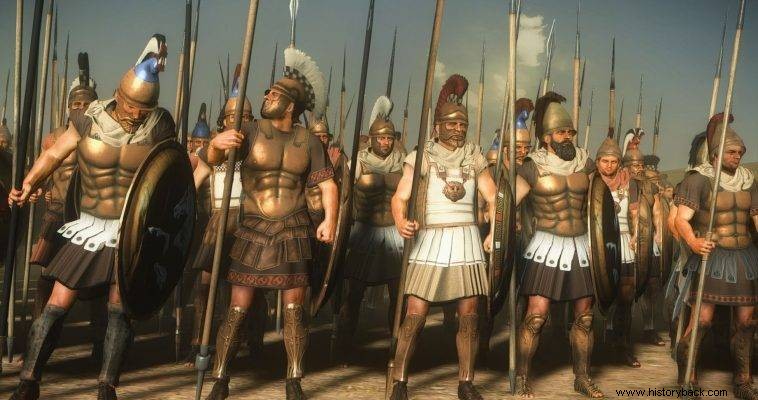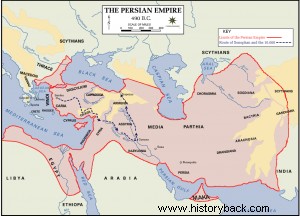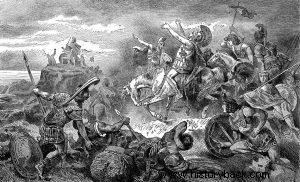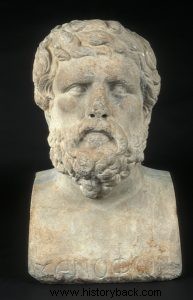
The Greek soldiers of the Myrian corps, having escaped, as they thought, from the enemy pursuit, after the massacre of their officers, looked forward to the future with optimism. They had camped in a place where there was an abundance of food. Besides, they deserved a little rest, as they had spent the last seven days marching through rugged mountains, fighting against very tough opponents, the Karduchs, reaching the borders of Armenia.
But their bliss was not to last for long. The next day, on the north bank of the Kendritis river, within the Armenian territory, they saw enemy horsemen, men of the satrap of Armenia Orondas. They were Armenian, Chaldean and Mardian men, mercenaries and subjects of the Persian army.
Given, therefore, the presence of strong enemy forces on the north bank of the river, the position of the Greeks automatically became extremely difficult, if not hopeless, as strong forces of Kardouchans, the people who lived in the area they were passing through, were concentrated behind them. The Greeks were surrounded.
The Chaldaeans brandished their spears menacingly and shouted words incomprehensible to the Greeks. In front of the infantry the numerous and elite Armenian cavalry of Orondas had taken up positions. Next to them were Martian archers, considered among the most elite of the Persian Empire.
From there the Greeks had to cross the river, the depth of which exceeded 1 meter, at its most fordable point. Indeed, a first crossing attempt was made, but failed. As it was natural great dysthymia seized the Greeks. All seemed lost. Everyone believed that they would never see their homeland and their beloved families again.
In the Kendritis river, thousands of kilometers away from the beloved Greece, they were to meet their end. Everything showed that their adventure would end on the banks of Kendritis. If the men were disappointed, their leaders were not. Of course they were under no illusions. They knew the situation was disappointing, but not tragic. Again Xenophon took the initiative, based on information brought to him by two young men. These men had observed a family of local people crossing the river, from a pore.
They crossed the river themselves and the water only reached up to their thighs. And not only was the river easy to cross at that point, but also on its northern (Armenian) bank there were large rocks, low as well as next to the bank, which made it impossible for enemy cavalry to move at that point. As was natural, the news electrified Xenophon, who passed it on to the other generals.
All together then met to decide on the most appropriate course of action, so that they would not be in danger from the Persian army and repel the Karduchus. Finally the generals decided that the army should cross the river by stratagem. Their purpose was to first expel the enemy cavalry from the north bank and then to face, if necessary, the Kardouchus.
The strategy
The army was divided into two divisions. The first, led by the Spartan general Cheirisophus, moved parallel to the south bank of the river, at a distance of about 800 meters, to the resource indicated by the two young men. The movements of Chirisofou's division were watched from the opposite bank by the enemy cavalry. The second division, led by Xenophon, was tasked with performing supercanonicals so maneuver against the enemy cavalry . He had with him the light infantry.
While Xenophon's division was taking up positions for the supposed maneuver, Chirisofos' division was entering the river. The men sang the paean and the civilians shouted loudly to frighten the enemies.
The Armenian horsemen, however, did not need to be frightened by the shouts of the Greeks. Fearing that Xenophon's division would actually attempt to cross the river further west and thus place them between two fires – Chirosophus to the east and Xenophon to the west – they did not even stand to meet the charge of Chirosophus's division, but fled.> .
Thus the section of Chirosofos safely crossed the river. But there was also the opposing infantry, which was lined up some distance from the bank. Against this, Cheirisophus immediately attacked with his hoplites, while the few Greek horsemen pursued the enemy cavalry with the assistance of the light infantry.
But the Chaldean spearmen and the Martian archers, seeing their horsemen pursued by the 50 Greek horsemen and the phalanx coming against them, formed in great depth and with the men chanting the paean , preferred to withdraw from the field and not try their luck against the Greek spears.
Already the one opposing army had fled. The obstinate Kardouchis, however, were now coming upon Xenophon's division, which was still on the south bank of the Kendritis river. Seeing them charging, Xenophon ordered his men to move with the greatest possible speed towards the source of the river, from where the division of Chirisofos had also passed and from where the under-packs were now crossing the river. At the same time, the Greek cavalry dominated the vessels of Oronda's army.
When they arrived near the source of the river Xenophon ordered his men to form a line of battle facing the Cardouhis. They had to hold for as long as they needed the Greek ships and the civilians to cross the river. In the meantime, the Kardouchis, seeing the civilian crowd crossing the river, perceived the small number of Xenophon's men, took courage and attacked, singing war songs.
Cheirisophus, meanwhile, having secured the northern bank, hastened to send reinforcements to Xenophon. He placed the peltasts, the slingers and the Cretan archers under the command of the Athenian amateur general. These men Xenophon ordered to stand ready on the northern bank, with their fingers on the nooses of their spears and on the strings of their bows, and with their leaden arrows in the sheaths of their slings.
And he divided them into two divisions, which, when the time came, would take positions on either side of Xenophon's men-at-arms, when the latter would retreat slowly across the river. And he ordered his hoplites, as soon as the stones from the enemy's slings began to hit their shields, to sing the paean and to rush against the Karduchs.
But as soon as the enemy turned their backs and began to flee, the trumpet would sound and immediately the hoplites would abandon the attack and hasten to quickly cross the river. If the enemies retreated they would have to face the projectiles of the light Greek infantry. And indeed everything developed exactly as Xenophon had planned.
As soon as the Kardouchi came within shooting distance and their missiles began to hit the Greek shields, the hoplites chanted the paean and charged towards them. The lightly armed Kardouchis naturally could not withstand the onslaught of the hoplites and turned their backs and began to flee. At the same time Xenophon ordered the trumpeter to give the signal for retreat.
This is how it happened and the hoplites stopped the attack and after making a change they ran to cross the river. Most of the Kardouchians continued to flee and did not realize the trick of the Greeks. However, some of them understood this, returned and began to attack the Greeks, wounding a few. A few moments later all the Greeks were in the safety of the northern bank of the river.
The nightmare was finally over. The Greeks had overcome the most difficult obstacle up to that time. Xenophon was absolutely right when he told men that whoever made the decision to die fighting, death would find him at home in old age. These men had already managed to defeat this fear, to master it, to annihilate it.

The course of Myria.

Xenophon (on horseback) and his men face the sea and salvation. 19th century engraving.

The general and historian Xenophon the Athenian.
